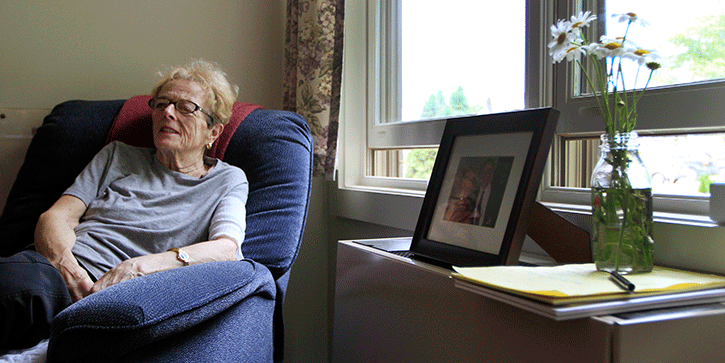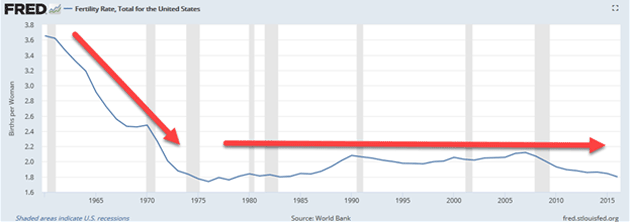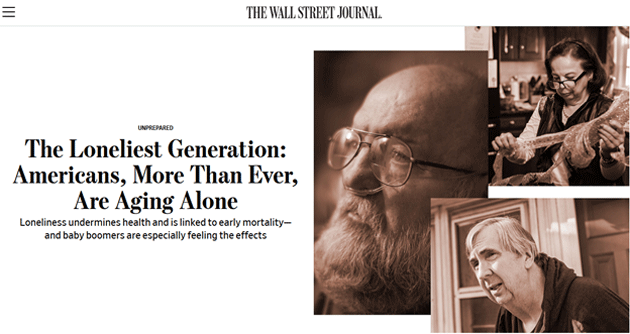
Lonely Boomers Are an Economic Opportunity
-
 Patrick Watson
Patrick Watson
- |
- December 18, 2018
- |
- Comments
Baby Boomers get blamed for all kinds of problems. Much of the blame is unfair, but there is no doubt the first postwar generation brought a lot of changes—culturally, economically, and otherwise.
Last month, I helped John Mauldin write his Pyramids of Crisis letter. It discussed the rapidly growing proportion of older people in the US, which is creating real problems for our pay-as-you-go retirement and healthcare systems.
John mentioned a debate he and I have been having for years. I’ve told him we will resolve the imbalance with some kind of “Soylent Green” solution. For the record, that’s a joke. I don’t really think we will round up older people and turn them into food.
However…
Something along those lines may be happening anyway... not because anyone wants it to, but as a result of decisions made decades ago.
The choices may have seemed sensible at the time. But as you’ll see, they had side effects.

Photo: Wikimedia Commons
New Choices
The Baby Boom generation was born in the 20 years or so after World War II ended in 1945. Soldiers came home and had children who then grew up in generally prosperous, peaceful times.
Like what you're reading?
Get this free newsletter in your inbox regularly on Tuesdays! Read our privacy policy here.
Then something occurred that would change the world.
- The oldest Boomers reached adulthood in the early 1960s, just as…
- The first oral contraceptives became legally available in the US.
We see one consequence in this chart.

Graph: St. Louis Federal Reserve Bank
The US fertility rate plunged from 3.7 in 1960 to 1.7 in 1976, then leveled off, in part because the generation then entering its prime child-bearing years suddenly had other options.
(To be clear, I’m not blaming anyone for their personal choices. I’m glad they could choose. We are simply observing the results here.)
This changed the economy. Women who would once have been mothers and homemakers entered the workforce and built careers. The presence of additional workers generated more growth but had other effects as well.
Fast-forward to 2018 and this Wall Street Journal feature story.

Image: Wall Street Journal
Baby Boomers are now aging, and many of them are on their own. About one in 11 Americans age 50+ has no living spouse or child—roughly eight million people.
These two things, though decades apart, are related.
The average member of a generation that had fewer children in its youth will have fewer close relatives in old age. Some will have no close relatives at all. That’s just math.
This is sad, but how is it an economic problem?
Like what you're reading?
Get this free newsletter in your inbox regularly on Tuesdays! Read our privacy policy here.
Well, loneliness is expensive because it is unhealthy. WSJ cites research showing it is worse for longevity than cigarettes, alcohol, obesity, or physical inactivity.
That means Baby Boomers who lack family support generate more Medicare costs for everyone. They might use up less in Social Security because they die sooner, but that doesn’t offset the added healthcare expenses. This aggravates our already-serious fiscal challenges.
Had Boomers produced more children, this might be a smaller problem—but they didn’t, nor have successive generations. So the traditional population pyramids will continue inverting and greatly complicate retirement planning for everyone.
Extended Lives
Now, this isn’t always a problem. Many Boomers lead happy, healthy lives without spouses or children. But it happens often enough to matter.
So a technological innovation changed people’s habits and attitudes, helping bring the situation we see now. Obviously, it had benefits as well. Technology usually cuts both ways.
Other medical advances have also been two-edged. We live longer, on average, but those additional years aren’t always productive or enjoyable.
(Another interesting question: Which of today’s wonderful technologies are seeding problems that will be appearing decades from now? I think smartphones and social media are good candidates.)
So if technology got us into this problem, could it also get us out?
My colleagues John Mauldin and Patrick Cox think biotechnology breakthroughs are coming soon that will extend the healthy, productive part of our lifespans, or healthspans. People may be as healthy in their 80s or even 100s as previous generations were in their 50s.
That will be great, if it happens, but much depends on how soon it happens. Boomers aren’t getting any younger.
Like what you're reading?
Get this free newsletter in your inbox regularly on Tuesdays! Read our privacy policy here.
Another question: If you’re one of those lonely aging Boomers, do you really want to live another decade or two? We could still get a sort of voluntary Soylent Green scenario if some people don’t take (or can’t afford) healthspan-extending technologies.

Photo: Pixabay
Wasted Capital
Growing your economy is hard when you lack capital. Human capital is the scarcest kind.
These lonely Boomers are part of the economy. They generate demand and could, in the right conditions, add to supply as well. We all miss an opportunity by letting their needs go unanswered.
WSJ mentions a group called Village to Village Network that helps communities organize to support elderly residents. This turns out to be less expensive than nursing homes. Better yet, bringing this part of the population out of the shadows helps create economic opportunities for everyone.
This can happen right now—it doesn’t require any new technology. But without some solution, this problem is going to get worse before it gets better.
See you at the top,

Patrick Watson
@PatrickW
P.S. If you like my letters, you’ll love reading Over My Shoulder with serious economic analysis from my global network, at a surprisingly affordable price. Click here to learn more.

 Patrick Watson
Patrick Watson
